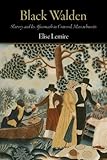Black Walden : Slavery and Its Aftermath in Concord, Massachusetts / Elise Lemire.
Material type: TextPublisher: Philadelphia : University of Pennsylvania Press, [2011]Copyright date: ©2009Description: 1 online resource (256 p.) : 11 illusContent type:
TextPublisher: Philadelphia : University of Pennsylvania Press, [2011]Copyright date: ©2009Description: 1 online resource (256 p.) : 11 illusContent type: - 9780812241808
- 9780812204469
- 974.44
- online - DeGruyter
- Issued also in print.
| Item type | Current library | Call number | URL | Status | Notes | Barcode | |
|---|---|---|---|---|---|---|---|
 eBook
eBook
|
Biblioteca "Angelicum" Pont. Univ. S.Tommaso d'Aquino Nuvola online | online - DeGruyter (Browse shelf(Opens below)) | Online access | Not for loan (Accesso limitato) | Accesso per gli utenti autorizzati / Access for authorized users | (dgr)9780812204469 |
Frontmatter -- Contents -- Introduction. The Memory of These Human inhabitants -- Chapter one. Squire Cuming -- Chapter two The Codman Place -- Chapter three. British Grenadiers -- Chapter four. The last of the race Departed -- Chapter five. Permission to live in Walden Woods -- Chapter six. Little Gardens and Dwellings -- Chapter seven. Concord Keeps its Ground -- Epilogue. Brister Freeman's Hill -- Dramatis Personae -- Notes -- Bibliography -- Index -- Acknowledgments
restricted access online access with authorization star
http://purl.org/coar/access_right/c_16ec
Concord, Massachusetts, has long been heralded as the birthplace of American liberty and American letters. It was here that the first military engagement of the Revolutionary War was fought and here that Thoreau came to "live deliberately" on the shores of Walden Pond. Between the Revolution and the settlement of the little cabin with the bean rows, however, Walden Woods was home to several generations of freed slaves and their children. Living on the fringes of society, they attempted to pursue lives of freedom, promised by the rhetoric of the Revolution, and yet withheld by the practice of racism. Thoreau was all but alone in his attempt "to conjure up the former occupants of these woods." Other than the chapter he devoted to them in Walden, the history of slavery in Concord has been all but forgotten.In Black Walden: Slavery and Its Aftermath in Concord, Massachusetts, Elise Lemire brings to life the former slaves of Walden Woods and the men and women who held them in bondage during the eighteenth century. After charting the rise of Concord slaveholder John Cuming, Black Walden follows the struggles of Cuming's slave, Brister, as he attempts to build a life for himself after thirty-five years of enslavement. Brister Freeman, as he came to call himself, and other of the town's slaves were able to leverage the political tensions that fueled the American Revolution and force their owners into relinquishing them. Once emancipated, however, the former slaves were permitted to squat on only the most remote and infertile places. Walden Woods was one of them. Here, Freeman and his neighbors farmed, spun linen, made baskets, told fortunes, and otherwise tried to survive in spite of poverty and harassment.Today Walden Woods is preserved as a place for visitors to commune with nature. Lemire, who grew up two miles from Walden Pond, reminds us that this was a black space before it was an internationally known green space. Black Walden preserves the legacy of the people who strove against all odds to overcome slavery and segregation.
Issued also in print.
Mode of access: Internet via World Wide Web.
In English.
Description based on online resource; title from PDF title page (publisher's Web site, viewed 24. Apr 2022)


